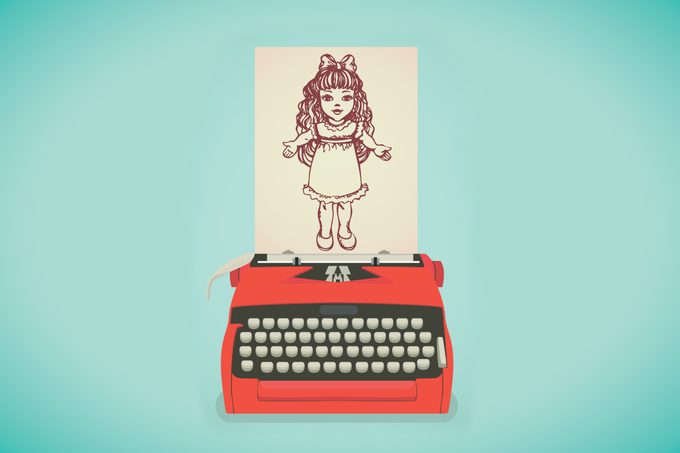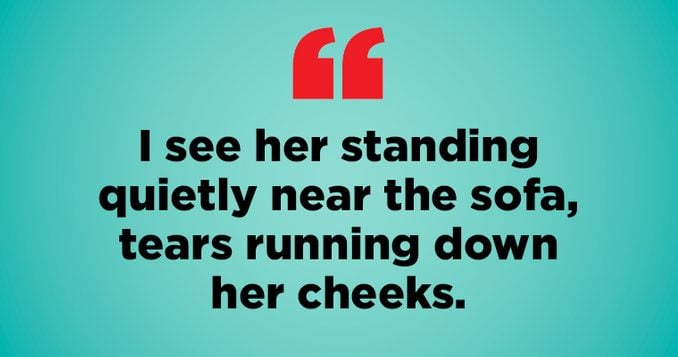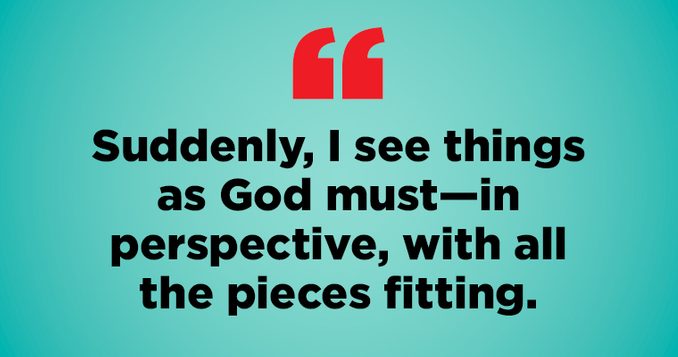One Father’s Battle Between Working and Giving Attention to His Daughter
Updated: Jun. 03, 2022
In this award-winning story, originally published in Reader's Digest in 1969, a father learns to embrace the chaos of his daughter’s toddler years.

“Missy,” I called to my wife, “did you smear Vaseline on my desk?”
“No, honey. Meghan probably did.” Just like that. Calm. As I’d feared, she had missed the carefully honed, double-edged irony of the question. I knew she hadn’t put it there.
The question was rhetorical; its only function was to make clear to her that she hadn’t done her job: Defend my desk against the aggressor.
I abandoned the conversation. I would deal with Meghan, our 22-month-old daughter, later.
All of that was yesterday. Today I sit here at that same rolltop desk, which I salvaged from a friend’s attic two years ago, and stare at the blank sheet inserted in the typewriter. I wait patiently for ideas to come to me, exam questions on Herman Melville for a test I will give my English students tomorrow. My wife is off to a reunion somewhere, but I am not alone. Our two children keep me company. Ten-month-old Edward cooperates to some degree; he spends most of his day poring over a seemingly endless array of cards, tags, and other assorted pieces of paper, plus a Sears, Roebuck catalog that he tears apart page by page. Occasionally he leans out and flails madly at the piano, which he can just reach.
But it is Meghan whose plans have been destined from all eternity to clash with mine today.
She follows a daily routine that is both time-consuming and challenging. It includes certain basic tasks: Watching the “grop.” (That would be the fish.) Sweeping the rug in her room and her crib. (Yes, Meghan sweeps her crib.) Sitting for a few minutes on the bottom shelf of the bookcase to determine whether she still fits there. (She fit yesterday, and the prospects look good for tomorrow.) Checking periodically on Edward. Climbing in and out of the stroller for practice. Testing the sofa springs. If you can relate, read up on these tips for playing with your kids when you’re tired.
Her constant companion through all of this is Dumpty, a shapeless rag doll whose best days are far behind him. A year ago, he was well stuffed and bursting with good cheer. His perpetual smile endeared him to Meghan immediately. She provides his transportation; he provides her security. The filthier he grows, the more she seems to rely on his wisdom and homespun philosophy.
About a week ago, my wife put Dumpty in the washing machine, hoping at least to make him recognizable. We were not ready for the emaciated creature that emerged. Dumpty had been disemboweled during the rinse cycle. My wife spent 20 minutes picking his foam rubber intestines out of the machine. We thought Meghan might discard this mere shell of a Dumpty. We were wrong. There was no detectable difference in her relationship with him, except that she found him easier to carry while performing her chores.
I can do my own work fairly well during most of these chores, and so I concentrate on Melville. (“Discuss the similarity of the alienation theme in ‘Bartleby, the Scrivener’ and Kafka’s Metamorphosis.”) But I am soon sidetracked. Unfortunately, I had not counted on the arrival of the “bib-bibs.” (“Bib-bibs” are birds.)
“Bib-bibs, bib-bibs!” shrieks Meghan, her eyes alive with expectation. She insists that I go with her to the window.
“In a second. Just let me finish this question. Have you read Kafka’s Metamorphosis, Meghan? You haven’t? You’d really enjoy it.”

The sarcasm leaves no mark, and she pulls me by the hand (two fingers, actually) toward the window. I see myself as a slow-wit in some novel, being led oaflike to watch the bib-bibs. And we do watch them. They chatter incessantly and leap back and forth on the lawn just outside our apartment window. Meghan is absorbed, but as I watch them, I wonder whether I parked the car under a tree last night.
Suddenly she bolts from the room (she seldom walks), and I hear her naked feet slapping against the wooden floor outside. She returns with Dumpty. She holds him up to the window, stretching him out by his two pathetic, triangular arms and whispering into his nonexistent ear, “Bib-bibs, Hindy, bib-bibs!” Dumpty smiles. It’s a much wider smile than it used to be.
I leave them in conversation and return to my desk. Within five minutes she appears before me, wearing her mother’s shoes. She reaches up to the typewriter keys and depresses four of them simultaneously.
“No, thank you, Meghan. Daddy’s seen your work. He’ll do it himself.”
She backs off. Out of the corner of my eye, I can see her in the kitchen watching the grop swim around in his circular world. I can see that the water in his bowl needs to be changed.
Back to the test. Determined. (“Discuss illusion and reality in Benito Cereno.”)
“Don’t even ask, Meghan. Not today.” She stands in front of me with her shoes and socks in her hands. I know the pattern. First the shoes and socks. Then the stroller. And pretty soon we’re in the park. She’ll want me to pick her a dandelion or a leaf from a tree. And she’ll clutch that leaf or dandelion the way she always does when we walk to the park.
Oh, yes, I know the pattern.
She rests her head on my leg, just as she did when she first learned to walk. She used to bring her plastic comb or her hairbrush and rest her head on my leg while I combed her hair. That ritual, however, ended after only a few months—much too soon for me.
Finally she leaves, and I watch her frustration as she sits on the floor and tries for several minutes to put on one of her socks. The art proves too elusive. In years to come, she’ll put on stockings or leotards with the ease and grace of a ballerina. But today, a tiny pair of socks defeats her.
She sees me looking! Back to work. (“What is the significance of the motto carved on the bow of Benito Cereno’s ship?”)
She pats the wicker chair, the comfortable one we sit in together to watch TV or to read, and she hastily gathers her books: The Poky Little Puppy, The Magic Bus, The Cat in the Hat, even that ancient copy of National Geographic with the penguin on the cover…Good Lord, she’s got them all. With her free hand, she tugs at my sleeve.
“No, Meghan,” I snap irritably. “Not now. Go away and leave me alone. And take your library with you.”
That does it; she leaves. She makes no further attempt to bother me. I can finish the test easily now without interference. No one trying to climb onto my lap; no extra fingers helping me type.
I see her standing quietly with her back against the sofa, tears running down her cheeks. She has two fingers of her right hand in her mouth. She holds the tragic Dumpty in her left. She watches me type and slowly brushes the tip of Dumpty’s anemic arm across her nose for comfort.

At this moment, only for a moment, I see things as God must—in perspective, with all the pieces fitting. I see a little girl cry because I haven’t time for her. Imagine ever being that important to another human being! I see the day when it won’t mean so much to a tiny soul to have me sit next to her and read a story, one that means little to either of us, realizing somehow that it is the sitting next to each other that means everything. And I see the day when the frail, loyal, and lovable Dumpty will vanish from the life of a little girl who has outgrown him.
I resent Dumpty for an instant. He’s consoling my girl, and that is my job. She and I have few enough days like this to share. So the paper slips gently into the top drawer; the hood slides over the typewriter. The test will get done somehow. Tests always get done.
“Meghan, I feel like taking a walk down to the park. I was wondering if you and Edward would care to join me. I thought you might like to go on the swings for a while. Bring Dumpty—and your red sweater too. It might be windy down there.”
At the word park, the fingers leave the mouth. She laughs excitedly and begins the frantic search for her socks.
Melville will have to wait, but he won’t mind. He waited most of his life for someone to discover the miracle of Moby-Dick—and died 30 years before anyone did. No, he won’t mind.
Besides, he’d understand why I must go right now—while bib-bibs still spark wonder and before dandelions become weeds and while a little girl thinks that a leaf from her father is a gift beyond measure.